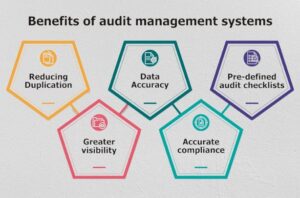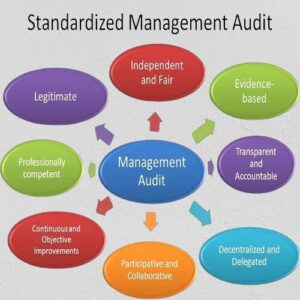Managerial Audit in Delhi: Ensuring Effective Governance, Risk Management, and Compliance
In today’s complex business environment, ensuring proper governance, risk management, and compliance (GRC) is crucial for any organization. A managerial audit helps assess these factors, ensuring that a company operates efficiently, adheres to legal requirements, and follows best practices. In Delhi, with its fast-paced corporate landscape, the need for comprehensive managerial audits is more critical than ever. This blog will explore the importance of managerial audits, the key areas they cover, and why organizations in Delhi must consider them as part of their governance framework.
What is a Managerial Audit?
A managerial audit is a systematic evaluation of an organization’s management processes, procedures, and policies to ensure that they are aligned with the company’s goals and regulatory requirements. This type of audit focuses on managerial practices rather than financial or operational performance. The key areas covered in a managerial audit in Delhi include:
Compliance Audit: Ensuring that the organization is adhering to local, national, and international regulations.
Governance, Risk Management, and Compliance (GRC): Examining how well the organization governs itself, manages risks, and complies with legal obligations.
In Delhi, the rise in corporate regulations and the growing need for accountability have made managerial audits a necessary tool for businesses looking to enhance their operational efficiency.
Importance of Managerial Audits in Delhi

The fast-growing business ecosystem in Delhi has resulted in increased regulatory scrutiny and a demand for higher levels of corporate governance. A managerial audit not only helps companies remain compliant with the law but also improves overall business performance by identifying inefficiencies and areas of improvement.
Compliance Audit Delhi: Delhi-based companies face a range of compliance requirements, from taxation to environmental regulations. A managerial audit ensures that all these regulations are met without gaps, reducing the risk of legal repercussions.
Governance Risk Management and Compliance (GRC) Delhi: Effective governance is about more than just following rules; it involves making informed decisions that align with long-term business goals. A managerial audit ensures that risk management and compliance systems are well-integrated into the company’s daily operations.
Compliance Risk and Governance: Managing compliance risks is essential for maintaining a company’s reputation and avoiding costly fines. A managerial audit identifies potential areas of non-compliance and suggests measures to mitigate those risks.
How Managerial Audits Help in Governance, Risk Management, and Compliance (GRC)
Governance, Risk Management, and Compliance (GRC) are three pillars that help organizations manage risk and meet regulatory requirements. Managerial audits play a key role in ensuring that these elements are aligned and functioning effectively:
Governance: A managerial audit assesses how well a company’s management systems work to maintain transparency, accountability, and adherence to the company’s policies.
Risk Management: By identifying and evaluating potential risks, a managerial audit helps companies prepare and respond to challenges before they escalate into major issues.
Compliance: The audit ensures that the organization complies with all relevant laws and regulations, from employment laws to environmental standards.
Why Businesses in Delhi Need Managerial Audits

With its booming business ecosystem, Delhi has become a hub for industries ranging from tech startups to large manufacturing companies. However, this rapid growth also brings increased scrutiny from regulators. Regular managerial audits help businesses in Delhi:
Stay compliant: Ensure adherence to local laws and regulations.
Enhance governance: Improve internal processes and decision-making frameworks.
Reduce risks: Identify and mitigate potential business risks.
Improve efficiency: Streamline management processes to boost productivity.
10 FAQs about Managerial Audits in Delhi
What is a managerial audit?
A managerial audit evaluates a company’s management processes, policies, and governance structure to ensure compliance, efficiency, and alignment with business goals.
Why are managerial audits important for businesses in Delhi?
Managerial audits help businesses in Delhi comply with regulatory requirements, improve governance, manage risks, and enhance operational efficiency.
How does a managerial audit differ from a financial audit?
Unlike a financial audit, which focuses on financial records and transactions, a managerial audit assesses management practices, policies, and governance frameworks.
What is included in a compliance audit in Delhi?
A compliance audit ensures that a company follows all applicable laws and regulations, including labor laws, environmental standards, and corporate governance policies.
How does governance, risk management, and compliance (GRC) affect managerial audits?
Managerial audits evaluate how well governance, risk management, and compliance systems are integrated within the company to ensure smooth and effective operations.
What are the key areas of a managerial audit?
The key areas include compliance, risk management, governance, and overall efficiency of the company’s management practices.
How can a managerial audit help with compliance risk and governance in Delhi?
A managerial audit identifies areas of non-compliance, evaluates governance practices, and suggests improvements to reduce compliance risks.
Who should conduct a managerial audit?
Managerial audits should be conducted by qualified professionals, such as internal or external auditors with experience in governance, risk management, and compliance.
What are the benefits of a governance risk management & compliance audit for Delhi-based businesses?
The benefits include better risk management, improved governance, regulatory compliance, and enhanced business efficiency.
How often should a managerial audit be conducted?
Managerial audits should ideally be conducted annually or biannually, depending on the company’s size, industry, and regulatory requirements.
Conclusion
For businesses a managerial audit in Delhi, is essential for ensuring that governance, risk management, and compliance systems are in place and functioning effectively. By identifying gaps and recommending improvements, these audits help businesses remain competitive and compliant in an ever-changing regulatory landscape.
Incorporating a managerial audit into your business operations is not just a legal necessity, but also a strategic tool for long-term success.




